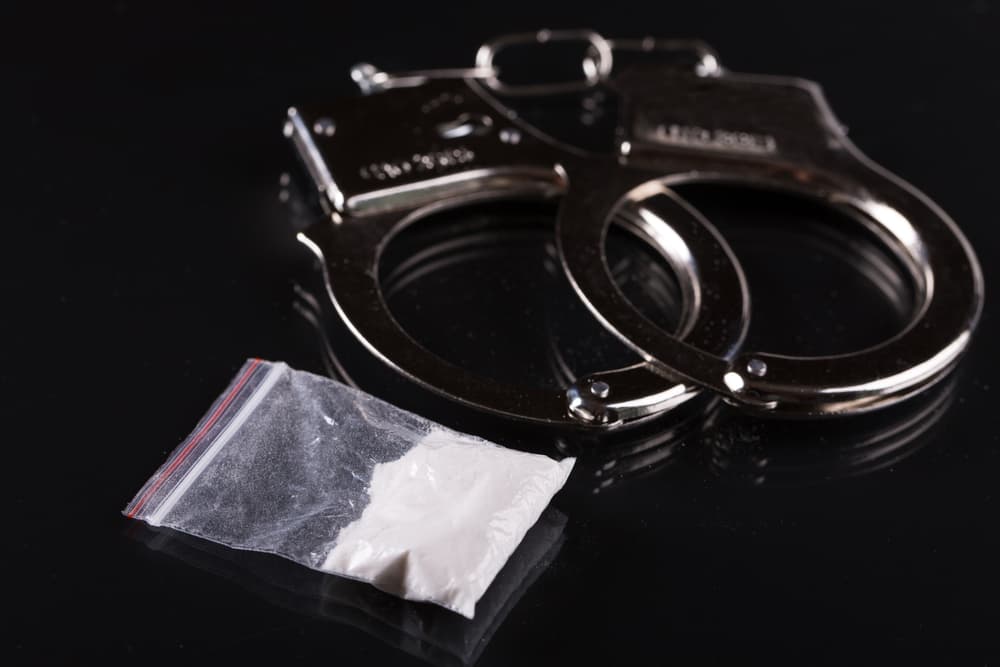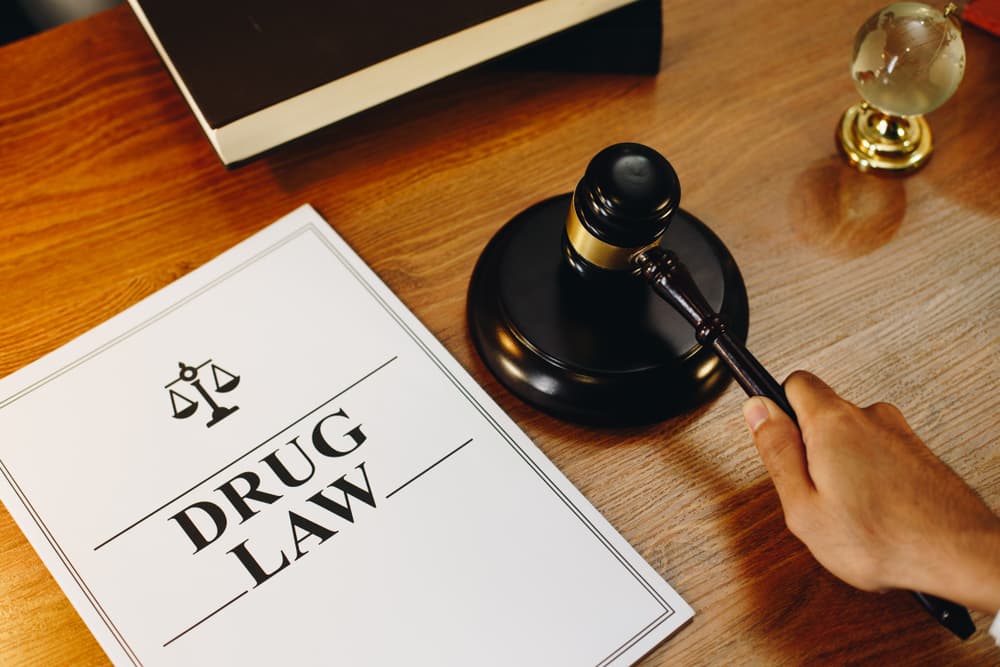Texas takes a firm stance on drug offenses, with particularly stringent laws surrounding dangerous drugs. But what exactly does this term mean?
In Texas legal parlance, dangerous drugs refer to substances not listed in the official Schedules I-V of controlled substances. While this definition might seem broad, the consequences of possession are precisely defined and often severe. These laws aim to combat drug misuse and protect public health.
If you or someone close to you is dealing with charges related to dangerous drug possession in Texas, seek immediate legal guidance from a qualified drug possession lawyer. The complexities of drug laws demand experienced navigation.
At the Law Offices of David M. White, we have decades of experience defending against drug charges. Our knowledgeable team can help you understand your rights and develop a strong defense strategy.
Don't face these charges alone. Call us at (325) 437-3311 today for a consultation and let us put our experience to work for you.
What Is a Dangerous Drug in Texas?
Under Texas law, a dangerous drug is defined as any substance that is not included in Schedules I through V or penalty groups but is unsafe for self-medication and requires a prescription.
According to the Texas Health and Safety Code Section 483.001, these drugs are legal only when prescribed by a licensed professional.
Examples of Dangerous Drugs

Dangerous drugs encompass a wide range of substances, including but not limited to:
- Prescription medications like certain painkillers and sedatives
- Certain over-the-counter drugs when used improperly
- Drugs used in veterinary medicine
These substances, while useful in medical settings, can pose significant health risks when misused or obtained without a prescription.
Differentiation from Controlled Substances
Dangerous drugs do not include controlled substances. The law categorizes controlled substances into different schedules based on their potential for abuse and accepted medical use. Dangerous drugs, on the other hand, do not fall into these schedules but still pose a risk due to their potential misuse.
Legal Consequences of Possessing a Dangerous Drug
Possessing a dangerous drug in Texas carries serious legal consequences. The state classifies these offenses based on the amount of the drug in possession and other circumstances surrounding the case.
Classification of Misdemeanors and Felonies
In Texas, possession of a dangerous drug is generally treated as a Class A misdemeanor.
However, certain factors can elevate the charge to a higher level of offense:
- Class A Misdemeanor: Up to one year in county jail and a fine up to $4,000.
- State Jail Felony: If aggravating circumstances exist, such as possession near a school or previous convictions, penalties may include 180 days to 2 years in state jail and a fine up to $10,000.
Specific Penalties for Possession
The penalties for possessing a dangerous drug can vary significantly based on the details of the case:
- First-Time Offenders: Typically face misdemeanor charges with penalties including jail time and fines.
- Repeat Offenders: May face enhanced charges and stiffer penalties, including longer jail sentences and higher fines.
Enhanced Penalties for Aggravating Factors
Certain situations can lead to more severe consequences:
- Possession Near Schools: Enhanced penalties apply for possession in drug-free zones, such as near schools or playgrounds.
- Large Quantities: Possessing large amounts of a dangerous drug can indicate intent to distribute, leading to felony charges.
Factors Influencing the Severity of Charges
Quantity of the Drug Possessed

The amount of the drug in possession is one of the most significant factors. Generally, larger quantities can result in more severe charges:
- Small Amounts: Typically result in misdemeanor charges.
- Large Amounts: May lead to felony charges, especially if there is an implication of intent to distribute.
Intent: Personal Use vs. Distribution
The intent behind possessing the drug also plays a significant role:
- Personal Use: Usually results in less severe charges.
- Distribution: Possessing drugs with the intent to distribute or sell can lead to felony charges, carrying heavier penalties.
Presence of Aggravating Factors
Certain circumstances can exacerbate the severity of charges:
- Drug-Free Zones: Possession near schools, playgrounds, or other designated drug-free zones often increases penalties.
- Repeat Offenders: Individuals with prior convictions may face harsher penalties, including longer jail sentences and higher fines.
- Association with Other Crimes: If possession is linked to other criminal activities, such as drug trafficking or violent crimes, the charges can be more severe.
Enhanced Penalties
Texas law provides for enhanced penalties under specific conditions:
- School Zones: Additional fines and longer jail sentences.
- Prior Convictions: Stricter penalties for repeat offenses.
Defenses to Possession Charges
When facing charges for possession of a dangerous drug in Texas, you need an attorney who can build a strong case for you. There are several legal defenses that an attorney can employ to challenge the charges and protect your rights.
Common Legal Defenses
- Lack of Knowledge
- One of the most common defenses is the lack of knowledge. If you did not know you possessed the drug, your attorney can use this to argue against the charges.
- Example: If the authorities found the drug in a shared space and you did not know they were there.
- Prescription Defense
- If a licensed medical professional prescribed the drug in question, presenting proof of the prescription can serve as a valid defense.
- Important: Ensure that the prescription is up-to-date and legally obtained.
- Illegal Search and Seizure
- The Fourth Amendment protects against unreasonable searches and seizures. If law enforcement violated your rights during the search or seizure process, any evidence obtained may be inadmissible in court.
- Example: If the police conducted a search without a warrant or probable cause.
- Chain of Custody Issues
- The prosecution must establish an unbroken chain of custody for the evidence. Any break or mishandling in the chain of custody can lead to the evidence being questioned or excluded.
- Entrapment
- If law enforcement induced you to commit a crime you would not otherwise have committed, you can use entrapment as a defense.
- Example: If undercover officers pressured you into possessing the drug.
- Temporary Possession
- This defense applies if you temporarily possessed the drug with the intent to dispose of it or turn it over to authorities.
- Important: You must prove you had no intention to use or distribute the drug.
- Medical Necessity
- In rare cases, demonstrating that possession was necessary to prevent a significant medical harm can serve as a defense.
- Example: Using a dangerous drug to manage an acute medical condition in the absence of a prescribed alternative.
- Insufficient Evidence
- Challenging the sufficiency of the prosecution's evidence can be a powerful defense. If the evidence against you is weak or circumstantial, it may not meet the burden of proof required for a conviction.
- Example: Lack of direct evidence linking you to the drug.
- Mistake of Fact
- If you genuinely believed the substance was not a dangerous drug due to misleading information or mislabeling, this can be a defense.
- Example: Receiving a mislabeled bottle of medication from a friend.
What an Attorney Can Do For You

Facing drug possession charges in Texas, particularly those related to dangerous drugs, can feel like navigating a minefield. With a complex legal system, you need professional legal representation in high-stakes cases.
Here are some of the things an attorney can help with:
Legal Expertise
- In-Depth Knowledge: Attorneys trained in drug possession cases possess extensive knowledge of state and federal drug laws. They understand the intricacies of the legal system and can interpret how specific laws apply to your case.
- Case Evaluation: Hiring an experienced lawyer can evaluate the evidence against you, identifying any weaknesses or inconsistencies that they can challenge in court.
- Strategic Defense: Your attorney will develop a tailored defense strategy based on the unique circumstances of your case, increasing the likelihood of a favorable outcome.
Procedural Guidance
- Navigating the Legal Process: Legal proceedings can be complex and confusing. A lawyer will guide you through each step, ensuring you meet all procedural requirements and deadlines.
- Paperwork and Filings: Your attorney will handle all necessary paperwork, filings, and documentation, reducing the risk of errors that could negatively impact your case.
Protection of Rights
- Safeguarding Constitutional Rights: A lawyer will protect your constitutional rights throughout the legal process. This includes defending against unlawful searches and seizures and ensuring fair treatment under the law.
- Preventing Self-Incrimination: Your attorney will advise you on what to say and what not to say to law enforcement and prosecutors, preventing self-incrimination.
Negotiation Skills
- Plea Bargains: Skilled attorneys can negotiate with prosecutors to secure plea bargains, which may result in reduced charges or lighter sentences. This is particularly important if the evidence against you is strong.
- Alternative Sentencing: Your lawyer can explore alternative sentencing options, such as diversion programs, probation, or drug treatment programs, which may be more favorable than jail time.
Courtroom Representation
- Trial Experience: If your case goes to trial, having an attorney with courtroom experience is invaluable. They can effectively present your case, cross-examine witnesses, and argue on your behalf.
- Jury Persuasion: Experienced lawyers know how to communicate with juries and present compelling evidence and arguments to sway the verdict in your favor.
Personalized Support
- Emotional Support: Facing drug possession charges can be stressful and overwhelming. Your attorney will provide emotional support and reassurance, helping you navigate the emotional aspects of the legal process.
- Confidential Advice: Attorneys offer confidential advice tailored to your situation, ensuring you make informed decisions about your defense strategy.
Impact on Future Opportunities
A conviction for possession of a dangerous drug in Texas can have far-reaching consequences beyond immediate legal penalties. It can affect various aspects of your life, including employment, education, housing, and more. These potential impacts highlight the importance of mounting a strong defense to avoid or mitigate these long-term effects.
Employment
- Background Checks: Many employers conduct background checks as part of the hiring process. A drug possession conviction can show up on these checks, making it harder to secure employment.
- Job Applications: Some job applications specifically ask about criminal convictions. Disclosing a drug conviction can disqualify you from certain positions.
- Professional Licenses: Certain professions, such as healthcare, law, and finance, require professional licenses. A conviction can lead to the suspension or revocation of these licenses, affecting your ability to work in your chosen field.
- Career Advancement: A conviction can hinder your chances of promotions or advancements within your company even if you are currently employed.
Education
- College Admissions: Many colleges and universities ask about criminal history during the admissions process. A conviction can negatively impact your chances of being accepted.
- Financial Aid: Federal financial aid programs, including grants and loans, may be denied to students with drug convictions, making it difficult to afford higher education.
- Scholarships: Scholarships often have character and conduct requirements. A drug conviction can result in you losing existing scholarships or disqualifying you from applying for new ones.
Housing
- Rental Applications: Landlords frequently run background checks on potential tenants. A drug conviction can result in denial of rental applications, making it difficult to find housing.
- Public Housing: Individuals with drug convictions may be ineligible for public housing assistance, limiting affordable housing options.
Social Stigma
- Community Perception: A drug conviction can lead to social stigma, affecting your reputation in your community and among peers.
- Personal Relationships: The stress and consequences of a conviction can strain personal relationships with family and friends.
Travel Restrictions

- International Travel: Some countries restrict entry to individuals with criminal records. A drug conviction can complicate or prevent international travel.
- Visa Applications: If you need a visa for travel or work abroad, a conviction can result in visa denials.
Legal Ramifications
- Future Legal Issues: A drug conviction can result in harsher penalties for any future legal issues, as judges will consider prior convictions during sentencing.
- Probation and Parole: Being on probation or parole can restrict your freedom, requiring regular check-ins with a probation officer and adherence to strict conditions.
Win Your Case With David H. White
Having a knowledgeable attorney by your side can make or break your case. The Law Offices of David M. White stand ready to defend your rights and help you achieve the best possible outcome.
With a deep understanding of Texas drug laws and a commitment to personalized legal strategies, our experienced criminal defense lawyers will fight vigorously on your behalf. We understand the stakes and are dedicated to protecting your future.
Don't face these charges alone. Call us today at (325) 437-3311 for a consultation. Let us provide the expert legal support you need to defend your rights and secure your future.
